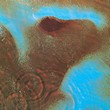|
|

Speakers' corner: Pink Floyd Following up our retro scope series of 2006 and 2007, 2009 and 2010 - here's the ever-continuing, never-stopping New Speakers' corner! Luna Kafé's focused eye on great events, fantastic happenings, absolute milestones, or other curious incidents from the historic shelves/vaults of rock. This moonth we're yet again 40 years back. Back before they were mega-huge, zillion-selling superstars. Before pigs could fly, before walls were built and came tumbling down, before great gigs in the sky, yes even before journeys to the dark side of the big cheese.
Pink Floyd It seems appropriate to remind that Pink Floyd had a recorded history before the release of Dark Side Of The Moon (1973), especially these days when the Floyd catalogue is being relaunched for the umpteenth time (it seems), including deluxe immersion boxes, beginning with the most popular albums. If you ask me, Floyd recorded the most interesting albums before Dark Side, with honourable exceptions for Animals (1978) and the better part of Wish You Had Hair (1975). For the Syd Barrett-devotees among us, The Piper At The Gates Of Dawn (1967), of course ranks highest. But don't you forget the post-Barrett albums A Saucerful Of Secrets (1968) or Atom Heart Mother (1970, well the title track at least) either. I kinda enjoy the soundtrack for the film More (1969), too, written and recorded in only eight days, in a distant time when creativity wasn't a question of studio hours but quite the opposite! Last but not least there is Meddle, released on October 30 1971 in the USA and two weeks later at home in Britain. Just like Atom Heart, Meddle includes one long epic number covering an entire LP side and a handful of songs on the other side. It begins with "One Of These Days", an effect treated angry metallic bass guitar glides slowly into the centre by the wind. Then another before a backwards (it seems) Hammond organ blows on followed by an aggressive guitar that brings more dimensions to the tune. Then we're into an electronic more or less atonal part (or is it even more backwards Hammond effects?) where the entire "lyrics" of the song is shouted out by a frustrated and metallic Nick Mason voice: 'One of these days I'm going to cut you into little pieces!' Enter an even more aggressive heavy guitar dominated part before everything blows away. Not the most typical of Floyd numbers, the closest they ever got to Punk Floyd. Along with "Main Theme" from More (point zero for Tangerine Dream I guess), "One Of These Days" was the most inspirational Floyd number for a vast number of contemporary (German) kraut bands. The contrast to the remaining four songs of the A-side of the album is striking. "A Pillow Of Winds" in particular is quite the opposite. A drowsy hippie song somewhere in the middle of a summer (Granchester) meadow. Almost a solo song by Dave Gilmour, I'd suspect. His acoustic and electric guitars and vocals are all over the song. "Fearless" starts in the same way, guitar dominated with Dave singing, but it's not quite as laid-back as the former. There are some disturbing noises in the distant background that play the key role by the end. It's the Kop at Anfield Road (home ground of Liverpool FC) chanting their famous anthem version of Rogers and Hammerstein's "You'll Never Walk Alone" and cheering for their home team. Strange, as Roger Waters at the time, at least, was a keen Arsenal fan and visited Highbury quite often. But anyway, it even gives me the thrills despite my distrust in football teams with red shirts. "San Tropez" and "Seamus" on the other hand gives a hint of Floyd's origins, with some twists. Both are blues numbers, sort of, the former rather happy-go-lucky with a jazzy vibe, particularly the piano accompaniment. "Seamus", that's the dog, a greyhound belonging to Steve Marriott of The Small Faces, if I'm not mistaken. And he sings/howls the blues in his characteristic hound way. Another one-of-a-kind Floyd song. Many believe this to be the weakest Floyd song ever. I think it's great fun. This later so serious band with few signs of hope demonstrates some well developed humour here. Let's flip the vinyl disc and we're really in for a treat. "Echoes" clocks in at 23 and a half minutes in the studio version. Live it might stretch our even further. In its embryonic state it was called "Nothing", later "The Return Of Nothing" and "The Return Of The Son Of Nothing" but ended as quite Something. When the band members started the recordings of the album, they had few ideas about any songs and recorded lots of short improvised bits together and individually. Most of these ramblings resulted in, yes, you got it: nothing. Anyway, "Echoes" starts with one of these elements, the characteristic high-pitched sonar note/ping of a grand piano played through a rotating Leslie speaker. Along with a brittle piano sound and guitar it slowly builds towards the first verse, quite nice compared to the cold and claustrophobic opening note. The verses as mainly sung by Gilmour and helped out by keyboard player Richard Wright. They are also quite laid-back, though not to the same extent as "A Pillow Of Winds". There's a shrieking and disturbing high pitched guitar in the background, soaring high in the sky, with shapes of things to come. The first two verses are followed by a great instrumental guitar excursion before we move into a funky theme. Honestly! Richard Wright knows what knobs to turn and keys to press on his Hammond and bassist Roger Waters funks along. Though not that funky. After all this is an all white male band. The guitars grow darker as we move on and slowly evolve into a really dark windy atonal electronic landscape, it seems, part. The eerie seagulls (or albatrosses?) shriek more than ever high in the sky while the hair in my neck stand on end. The shrieks are not electronic after all, produced by Gilmour's electric guitar, discovered accidentally when he plugged his wah-wah pedal the wrong way. The song moves slowly into the light again, very slowly. This time around even that opening piano note sounds nice and warm. After the last verse there is yet another nice guitar and Hammond instrumental passage that slowly leads to the fade out and the song vanishes in the same wind that opened the album. There are parts of "Echoes" that, to me, brings out the essence of the band in the first years after Barrett left. Both the start of the song, the instrumental bursts directly after each verse, the eerie shriek part and the slow return to the light afterwards make my heart throb a little harder, pumping more adrenaline through my veins than usual. I once saw a documentary about surfing on the television. The latter half of the programme only consisted of a camera being held at sea level, half way above water and half way below the surface. The underwater pictures had about the same green-blue colour as the underwater ear depicted on the cover of Meddle. The soundtrack of the scene was the entire "Echoes" without any interruptions by dialogue or other sounds. I think it is the very best music "video" I've ever witnessed... Some people have a theory that the song was produced to work as a soundtrack to the last part of Stanley Kubrick's epic movie 2001: A Space Oddysey, the part called "Jupiter And Beyond The Infinite", where the film flips out as the astronaut moves closer and closer to a black hole in the sky. The band has denied this, but it's worth checking out anyway. The recording of Meddle took place at Abbey Road Studios between January and June 1971, and completed at Morgan Sound Studios and George Martin's state of the art AIR Studios the following couple of months. Abbey Road only possessed eight track recording machines at the time, while the two others could boast of 16. Pink Floyd needed as many as available because of the way they recorded/experimented/composed simultaneously in the studio. The album was produced by the band members themselves and engineered by Pete Brown and John Leckie. The latter found later fame and eventually fortune as the producer for Public Image Ltd., Magazine, XTC, The Stone Roses, Radiohead and Norwegian DePress, to name but a few. Meddle was the last ordinary album by the band written as joint band effort before the writing of the lyrics, and to some extent music, was dominated by Roger Waters' visions. When I was in my early teens, Meddle, as well as Who's Next, only was in the possession of a couple of cool big boys in my neighbourhood four or five years older than me. I didn't get my own copy until I was 17. But listening to "Echoes" again today some 35 years later, I feel the same exhilaration as during those early spins back then. Copyright © 2011 JP
|
| You may also want to check out our Pink Floyd articles/reviews: Dark Side of the Moon, Early Years 1967-72 Cre/ation, Piper At The Gates Of Dawn. |
| © 2011 Luna Kafé |
